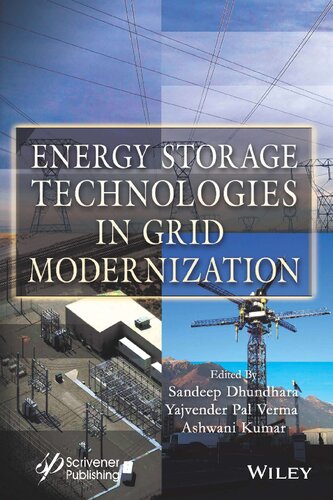

Most ebook files are in PDF format, so you can easily read them using various software such as Foxit Reader or directly on the Google Chrome browser.
Some ebook files are released by publishers in other formats such as .awz, .mobi, .epub, .fb2, etc. You may need to install specific software to read these formats on mobile/PC, such as Calibre.
Please read the tutorial at this link: https://ebookbell.com/faq
We offer FREE conversion to the popular formats you request; however, this may take some time. Therefore, right after payment, please email us, and we will try to provide the service as quickly as possible.
For some exceptional file formats or broken links (if any), please refrain from opening any disputes. Instead, email us first, and we will try to assist within a maximum of 6 hours.
EbookBell Team

4.7
96 reviewsWritten and edited by a team of experts, this exciting new volume discusses the various types of energy storage technologies, the applications of energy storage systems, their role in the real-time operation of power markets, and the operational issues of modern power systems, including renewable-based generating sources.
The worldwide energy sector, specifically power generation, has undergone a huge transformation in recent years, and the focus is to make it sustainable, environmentally friendly, reliable, and highly efficient. As a result, a significant share of highly intermittent but clean renewable sources is being integrated into the power system using advanced technological components. The higher penetration level of renewable energy sources (RESs) has increased the active power generation share in the grid but reduced the total rotating system inertia. This high reduction in inertia brings new challenges and technical issues to the operators of modern power systems and impacts the stability and security of the grid.
The stochasticity of these renewable sources also poses a big challenge to the efficient operation of the power system. Electrical energy storage systems help to manage such issues and challenges that occur due to the intermittent nature of RES and can play a big role in the smooth and reliable operation of the power system. The applications and opportunities to use storage on the grid are growing due to the improvements in energy storage technologies, and flexible regulatory frameworks. Technological developments have made it possible to use batteries and other Energy Storage Systems (ESSs) for managing the operation of the power system.
This book aims to illustrate the potential of energy storage systems in different applications of the modern power system considering recent advances and research trends in storage technologies. These areas are going to play a very significant role in future smart grid operations. This book discusses the various types of energy storage technologies and promotes the applications of ESSs in the performance improvement of modern power systems. Whether for the veteran engineer, new hire, or student, it is a must-have for any library.